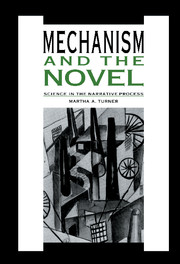Book contents
- Frontmatter
- Contents
- Acknowledgments
- 1 Introduction
- 2 The concept of mechanism
- 3 The Aristotelian logic of settlement in Austen's Pride and Prejudice
- 4 Scott's The Bride of Lammermoor: empiricism, mechanism, imagination
- 5 Cosmology and chaos in Dickens's Bleak House
- 6 Scientific humanism and the Comic Spirit: from The Ordeal of Richard Feverel to The Egoist
- 7 Old mindsets and new world-music in Conrad's The Secret Agent
- 8 Women in Love: beyond fulfillment
- 9 The mechanistic legacy: Lessing's Canopus in Argos: Archives
- Notes
- Bibliography
- Index
- Frontmatter
- Contents
- Acknowledgments
- 1 Introduction
- 2 The concept of mechanism
- 3 The Aristotelian logic of settlement in Austen's Pride and Prejudice
- 4 Scott's The Bride of Lammermoor: empiricism, mechanism, imagination
- 5 Cosmology and chaos in Dickens's Bleak House
- 6 Scientific humanism and the Comic Spirit: from The Ordeal of Richard Feverel to The Egoist
- 7 Old mindsets and new world-music in Conrad's The Secret Agent
- 8 Women in Love: beyond fulfillment
- 9 The mechanistic legacy: Lessing's Canopus in Argos: Archives
- Notes
- Bibliography
- Index
Summary
One mark of science's influence upon the academic establishment is the institution-wide privileging of specialization. A pioneer in the revolutionary science of chaos explains the traditional scientific approach:
There's a fundamental presumption in physics that the way you understand the world is that you keep isolating its ingredients until you understand the stuff that you think is truly fundamental … The assumption is that there are a small number of principles that you can discern by looking at things in their pure state … and then somehow you put these together in more complicated ways when you want to solve more dirty problems.
Other disciplines have followed suit, building the empire of knowledge incrementally through a cognitive policy of conquest through division. As has often been noted, the emergence of English departments early in this century grew out of a perceived antithesis between literary ways of seeing and communicating and scientific ones. Champions of literature observed that literature speaks figuratively, its propositions are universal, while scientific language is representational, its claims local and specific. Or sometimes the poles have been reversed, with the sensuous immediacy of literary language contradistinguished from science's abstracting tendencies – what Alfred North Whitehead called its “Fallacy of Misplaced Concreteness.” In either case, literature's place in the culture has been defined through its opposition to science.
Yet literature as an institutional field of study is still for the most part structured in terms of the specialization model borrowed from the sciences.
- Type
- Chapter
- Information
- Mechanism and the NovelScience in the Narrative Process, pp. 1 - 14Publisher: Cambridge University PressPrint publication year: 1993

